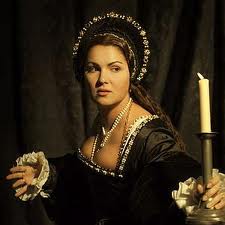We pride ourselves at 21C on getting most of our information right – factually and grammatically. But as Glenn often reminds us: only Allah is perfect. And perfect today’s press release about Anna Netrebko certainly wasn’t, as a journalist rightly pointed out to me this afternoon.
Can you spot the mistake? http://www.21cmediagroup.com/mediacenter/newsitem.php?i=651 [Oh – it’s been fixed. – Ed]
I’ll give you the paragraph in question.
“The first in a trilogy of operas Gaetano Donizetti wrote about the Tudor period (Maria Stuarda, named after Mary, Queen of Scotts, and Roberto Devereux, about the reputed lover of Elizabeth I, are the other two), Anna Bolena follows the tragic demise of Anne Boleyn, the second wife of Henry VIII who literally lost her head because she could not bare the King a male heir. The soprano role is considered one of the most challenging in the bel canto repertoire, making the opera difficult to cast and rarely performed. The fall 2011 production at the Met, which is staged by David McVicar and also stars Garanca as Giovanna, in fact marks the work’s Met premiere.”
Brownie points if you can spot more than one mistake …


SPOILER!!! Read no further if you don’t want to see any of the answers!
1. Henry VIII who literally lost her head
2. she could not bare (bear) the King a male heir
3. making the opera [difficult to cast and] rarely performed
4 in fact marks the work’s Met premiere [‘in fact’ is redundant]
Have I missed any?
I always feel like a bit of a jerk for pointing these things out, on the rare occasions that I actually notice them. But since you asked…..
I spotted bear/bare and Mary was queen of Scottish people, not people called Scott, so it only has one t at the end, no?
Should there also be a comma after Henry VIII so it doesn’t seem like he was a woman. He had enough problems without adding gender confusion to the list…although that would explain his difficulty with producing children.
And, for super pendant points — does King get a capital when he’s no longer reigning? – as in he’s no long *the* king but *a* king.
Personally, I would add a “therefore” before “rarely performed” for clarity but I don’t think the current construction is grammatically incorrect.
Lots of brownie points to you, Marcia! I’m not sure that I agree about the comma after Henry VIII: if anything, I think putting a comma after his name links the ‘who’ more to him than to his wife. My dad also pointed that out. And I’m equally ambivalent about the capital K for king, since he was the King when she was trying to bear him a child and kings and queens do get special treatment with capital letters (which I’m usually averse to). That’s another tough one. And finally, I agree about clarifying the ‘rarely performed’, even though it is technically correct.
Thanks for the input! It’s fun and appreciated.
I should have read Brian and Marcia before posting! Mea Culpa!